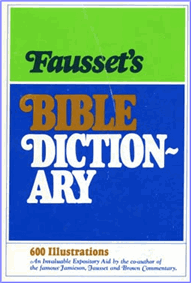Fausset's Bible Dictionary
A B C D E F G H I J K L M N O P Q R S T U V W X Y Z
Harlot
(On the spiritual "harlot" (See ANTICHRIST and Isaiah 1:21; Revelation 17; contrast Revelation 12 and BEAST.) Fornication was regarded by the unconverted Gentiles as a thing indifferent in itself, having no moral guilt intrinsically; hence in the Jerusalem decree (Acts 15) it is classed with things which Gentile usage allowed but Jewish law forbade. The moral abomination of it is elsewhere condemned as excluding from heaven (1 Corinthians 6:9-20). The general Hebrew term zownah expresses any licentiousness in the married or unmarried; so the Greek porneia in Matthew 5:32. Zarah and nokriyah, "the strange woman," implies that foreign women were those often found among the harlot class. In Proverbs 5:17-20 "strange" seemingly contrasts with one's own rightful wife; another term, qudeeshaah, "consecrated woman" (in Genesis 38:21-22; Deuteronomy 23:17; Hosea 4:14), refers to the abominable worship of the Syrian Astarte or Venus by prostitution.
By divine retribution in kind Israel's sin was made its punishment: "My people have gone a whoring (spiritually as well as literally) from under their God ... therefore your daughters shall commit whoredom, and your spouses shall commit adultery." What ye do of your own will, desert your divine Father and Husband, your daughters and wives shall do against your will, desert you and Him. The people's idolatry became the source of dishonour to those to whom their honour was dearest, their wives and daughters. "The men of Babylon made Saccoth Benoth" their idol in Samaria (2 Kings 17:30); the idol's name means "booths for their daughters," referring to their prostitution in this detestable worship. The masculine qadesh, "Sodomites," implies male prostitution in the same vile worship (Deuteronomy 23:17; 1 Kings 14:24; 1 Kings 15:12; 1 Kings 22:46; 2 Kings 23:7; Job 36:14).
Tamar veiled herself and sat by the wayside as a consecrated harlot (qedeesh) under a vow, and was so regarded by Judah. Herodotus (1:199) mentions the impure custom in the Babylonian worship of Mylitta, so that of the Dea Syra at Byblos very anciently. Singing and harping about a city was the badge of a harlot (Isaiah 23:16). Male relatives exercised unlimited power in punishing unchaste women for the family dishonour (Genesis 38:24). A priest's daughter playing the whore was burnt to death (Leviticus 21:9). The children of a harlot could not inherit with legitimate children (John 8:41; Deuteronomy 23:2), but "bastard" means probably one born of incest or adultery; so the rabbis explain Judges 11:1-2.
Bibliography Information
Fausset, Andrew Robert M.A., D.D., "Definition for 'harlot' Fausset's Bible Dictionary".
bible-history.com - Fausset's; 1878.
Copyright Information
© Fausset's Bible Dictionary
Fausset's Bible Dictionary Home
Bible History Online Home
Bible Encyclopedia (ISBE)
Online Bible (KJV)
Naves Topical Bible
Smith's Bible Dictionary
Easton's Bible Dictionary
Schaff's Bible Dictionary
Fausset's Bible Dictionary
Matthew Henry Bible Commentary
Hitchcock's Bible Dictionary

Dr. A.R. Fausset
Popular and Trending:
Meaning and definition of fasting, what is fasting in the bible, fasting definition, why should I fast, the power of prayer and fasting, Location of Galilee, where was galilee in the bible?, fasting definition, Galilee region, cities of Galilee, Sea of Galilee, Definition of biblical fire, what is fire in the bible?, fire and brimstone, fire meaning, baking bread with fire, Definition of the biblical firmament in Genesis, what is the firmament in the bible?, was the firmament the third heaven, firmament meaning, did the firmament bring the flood of Noah?.
